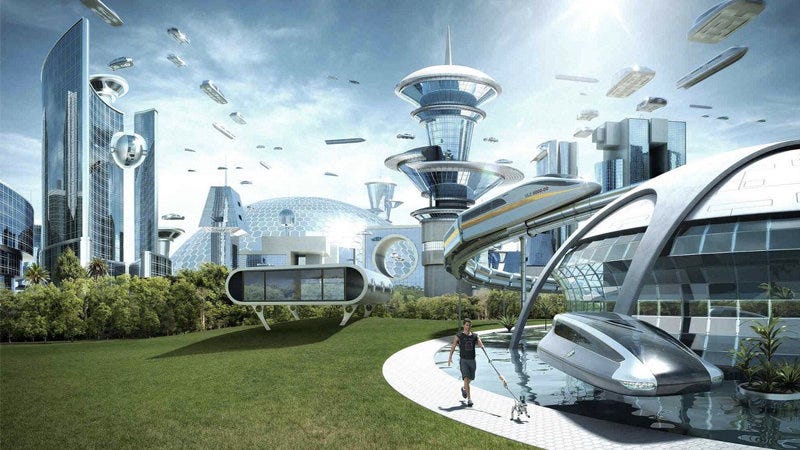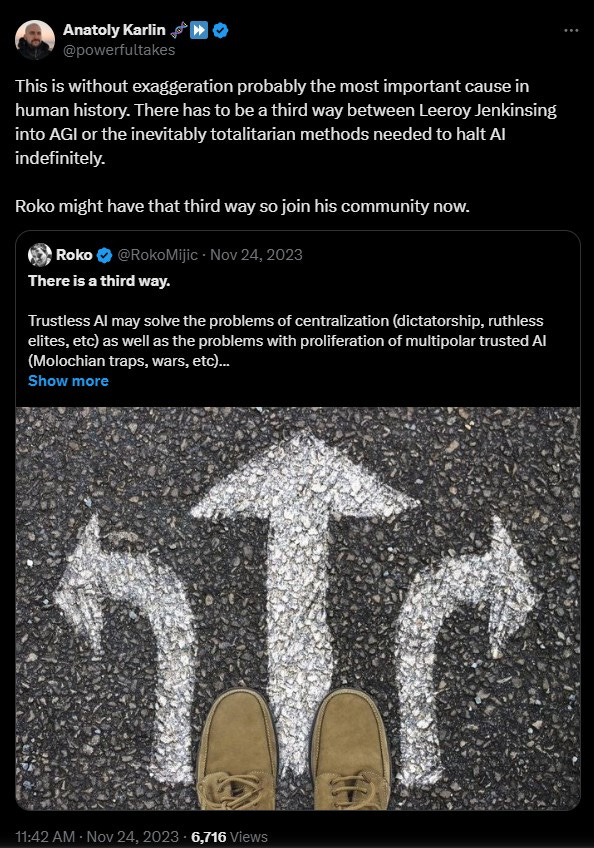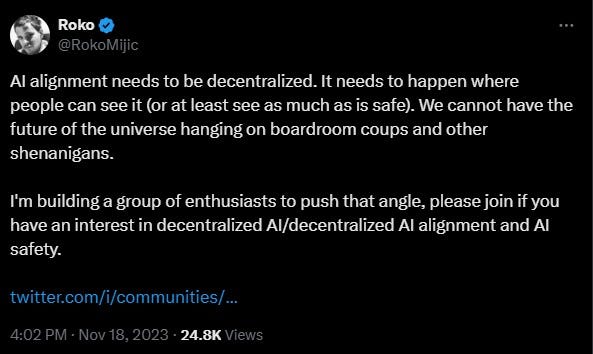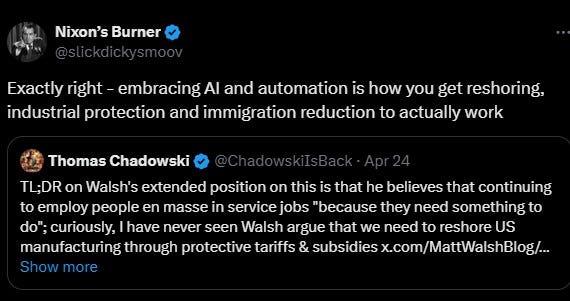Distributism Needs a Techno Upgrade for the 21st Century, by Robert Stark
Distributism is an alternative third way economic theory that critiques capitalism and socialism as two heads of the same coin, as far as being monopolistic. Socialism leads to State consolidation over the economy while capitalism leads to oligarchy. From a Distributist standpoint, when the economy and institutions are heavily centralized, it does not matter whether it is under private or state control. Distributists advocate for property and the means of production to be distributed among the people but are not in favor of abolishing private property and private enterprise like Marxists. The Distributist protests that the problem with capitalism is that there are too few capitalists. Distributists advocate for anti-trust to break up large monopolies, to bring wealth back into communities, rather than communist-style mass confiscation of wealth.
Capitalism is better at generating wealth but exacerbates inequality, while socialism is bad for generating wealth but limits inequality. While there are different variations of capitalism and socialism, Distributism is the only economic system that can ease inequality without stifling economic growth. Capitalism cannot adapt to automation, degrowth, and an aging population. Today there is a shift away from neoliberalism towards state capitalism, under Trump and Biden, which has the potential for both good and bad.
While capitalist detractors will say Distributism is just Marxism-light, it has a track record of success. For instance, South Korea, Japan, and Taiwan successfully adopted distributist policies under the guise of General MacArthur and Northern Italy’s Emilia Romagna region, where distributism-inspired co-opts produce about 1/3rd of the region’s GDP. Distributism also addresses the zero-sum competition over wealth, as well as the slippery slope fallacy from conservatives towards any degree of wealth redistribution.
Distributism was a reaction to the Industrial Revolution that consolidated and centralized wealth and power and caused dislocation and anomie, much like we see today with the digital revolution. However, Distributism’s shortcoming is that as a movement of Luddites, they lack a program for how their economic theories can adapt to automation and the Technological Singularity. Distributists tend to be older trad Catholics who come short at appealing to the younger tech-savvy dissident demographic.
There needs to be a techno distributism or high-tech localism that can address the problems caused by rapid technological change without going full Luddite, an approach history shows fails. The problem is that a digital economy might be harder to break up with anti-trust than traditional industries. Citizens would have to be equal shareholders in companies that own AI and robotics which sounds socialist. I suppose you could say it is a version of socialism that empowers people directly rather than bureaucracy. In the German Democratic Republic, during the 1980s, every citizen owned about 40k Deutsch Marks worth of state-owned enterprises. However, this wealth was wiped out during the reunification.
Noam Chomsky has long been a proponent of something like Cybernet Distributism. In an interview, Chomsky said “Its true that contemporary technology permits decentralization, it also permits centralization. It depends on how you use the technology. Look, contemporary technology could be used to eliminate ownership and management of corporations. It could be used to provide — lets say Apple computers. In principle information technology could be used to provide direct information to the work force on the ground so that they could democratically decide what the company would do, eliminating the role of management. It could be used for that. People aren’t developing technology for that purpose.”
A major reason to be pessimistic is that the internet promised decentralization but led to the greater consolidation of wealth, ownership and power. The 20th Century perfected techniques for exploiting the masses along central veto points. The question is whether the position of anti-bureaucracy and anti-capitalism is only viable in a pre-industrial/traditional society. Once the economy and technics become highly complex you tend to get either entrenched bureaucracy or cutthroat capitalism.
Source: @powerfultakes on X
Solutions to prevent consolidation include, focusing on open source transparency, Trustless AI, decentralized governance, regional public banking, AI infrastructure standards, data & digital asset ownership, legalizing alternative currencies, and a decentralized Blockchain, perhaps backed by gold. Anti-trust of AI is also crucial and AI will have to be highly taxed, perhaps a progressive corporate tax, to mitigate the problem of soaring inequality, as the AI owners become like the Gilded Age rentier class. Greater civil liberties protections are also needed due to the greater mass surveillance potential of AI.
There is a push for AI to be regulated, censored, and directed from the top down, just like social media. If AI allows for outsiders to create competing entertainment, media, and technology programs, it would limit the Regime’s and oligarchy’s primary mechanisms of control over the populace.
Source: @RokoMijic on X
There will always be outlier sectors where consolidation does not necessarily lead to increased efficiencies. While there might be greater AI-driven consolidation in some industries, like long-distance cargo trucking with self-driving trucks, there are other sectors of the economy where AI might lower entry barriers and spur entrepreneurship, and thus ownership opportunities.
While crypto has the potential to decentralize the economy, there is also concern it could be a path to a digital dollar. I am skeptical that crypto currencies will replace and weaken centralized governments, except perhaps in deindustrialized Third World nations, especially Africa. The big question is whether decentralized smart contract cryptos like Worldcoin are a net benefit or not in terms of AI risk. If not, the possibilities of a more decentralized economy and society are bleak.
Source: @jmrphy on X
Alternative History Youtuber, Whatifalthist, optimistically predicts that the gig economy will lead to decentralization rather than a dystopian scenario of technocratic control. Whatifalthist envisions workers as independent contractors but with the State providing healthcare and UBI. AI would make healthcare cheaper and fund a generous UBI that offsets lower wages. It also helps that remote work enables people to move to more affordable areas. Ideally, gig economy independent contractors would work as members of guilds rather than for corporations, which is basically guild socialism.
Certainly, Whatifalthist will get accused of pushing a libertarian technocracy by Progressives but this model has the potential to work from the standpoint of decentralization. While UBI has the potential to empower and enrich the people, the concern is that elites will perform that “Great Reset” with a UBI just large enough to keep themselves from getting guillotined. The question is how to prevent elites from retaining the lion’s share of economic rents for themselves.
Automation making farming less labor intensive has the potential to go either way, consolidation of agriculture or new opportunities for small-scale farmers. Artificial meat putting factory farming out of business might create openings for small farmers to sell high-quality humanly-raised meat as a luxury. In contrast, artificial meat covers the low-end, fast food market. The issue with small organic regenerative farming is transport and delivery, so it is hard to access supermarkets, except for high-end markets that cater to organic, local goods. However, this can be resolved by apps, and in the future, drones for transportation. Also, a version of 3d printers could recreate the old-school craftsman process where people can create custom furniture, home appliances, and even houses from scratch.
The Luddite opposition to AI is bound to fail. You can’t have a moratorium on AI development without an extreme global surveillance program and free speech curtailment. Caps on hardware are the only halfway viable solution. Rightwing populists, like Tucker Carlson, are self-defeating in their call to stop AI and automation and their obsession with preserving an obsolete 20th Century economic model. Embracing automation is the only way to achieve national populist objectives, like onshoring manufacturing and reducing immigration. There are also positive benefits of automating the managerial and bureaucratic class, thus empowering both the most creative, as well as tradesmen whose jobs can’t be automated.
Source: @slickdickysmoov on X
In Guillaume Faye’s, Archeofuturism there are these trad societies that opt-out and are tolerated, but their citizens become totally marginal. I predict this will eventually happen to those who reject technology. However, as with the embrace of walkable cities as a reaction to auto-centric living, I see people seeking out balance. Basically, technology advances but there are spaces free of technology that are carved out and supported. We already see this with schools banning smartphones.
Even if we achieve a post-scarcity economy, there are other issues relating to human nature, such as how people jokey for status or seek out roles in society that suit their personal strengths. A non-monetary society will be especially ripe with interpersonal wars for status. A lot of people won’t be able to adapt to these changes, so rebuilding social capital and restructuring society away from work and toward socializing, self-actualization, and leisure is crucial, much like the Fully Automated Luxury Communism book and meme.
Adapting to the Technological Singularity will require a new political movement and framework that combines aspects of socialism, nationalism, technocracy, and libertarianism. All existing political movements from Progressives to MAGA fall short at offering solutions and are stuck in a 20th-century mindset. Even Andrew Yang, who initially seemed promising, ended up being a disappointment. The reality is nobody knows what is going to happen with AI, as people have been wrong about past predictions about future technological changes.






